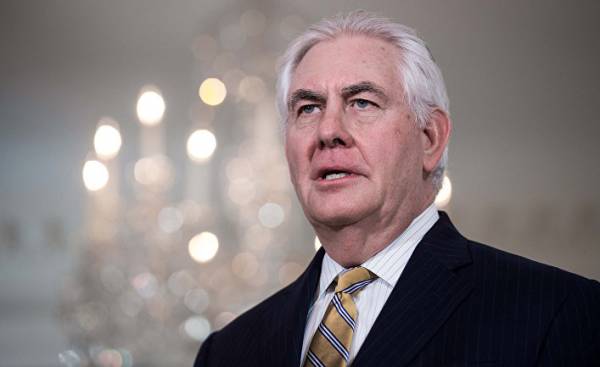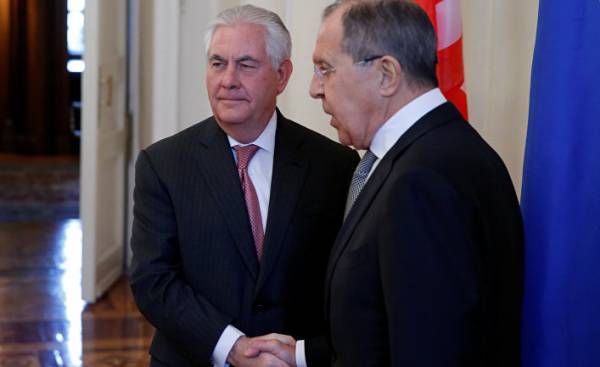
Steve Inskeep: I want to start with North Korea. We heard you said, “the era of strategic patience has ended”, so we know what your policy is. Is there a word or phrase with which you can explain to us what is your approach to North Korea?
Secretary Rex Tillerson: Yes, our approach to North Korea is to force them to change their position in any future negotiations.
And I think when we say that the era of strategic patience has ended — in the past, I think we always managed to reach agreement and to ensure that to sit down at the negotiating table. Now when they behave inappropriately, we will agree on the issues to get them to sit down at the negotiating table, and then decide what we will offer them to keeping up appearances. Now we had no room to maneuver, given how far they had progressed in implementing its program. So this approach is to pressure them through the imposition of all sanctions and through other methods of diplomatic pressure. And reach out to others, that they forced Pyongyang to change its idea of what will really allow him to achieve the security, which, according to him, he seeks.
Whether you are going to hold direct talks with North Korea? Is it your goal?
— Of course, that’s exactly what we would like to solve this problem. But North Korea must decide whether it is ready to discuss with us the necessary, the right agenda and the right agenda is not only that they stopped where they are, another few months or a few years, and then it all continued. This agenda has existed for the last 20 years.
Help me understand, please, what from your point of view will be considered a success. What should be the goal?
Well, our goal is the same as China, i.e., transforming the Korean Peninsula into a nuclear-free zone.
— North Korea did not have nuclear weapons?
The denuclearization of the Korean Peninsula. All very clear and understandable: this is the official policy of China, it is our official policy and it is the official policy of our allies in the region. And I would like to briefly add, you know, we are a part of work carried out — we withdrew our nuclear weapons from the Korean Peninsula. It is time for North Korea also removed their weapons.
Is this goal feasible?
— This is our goal. This is our only goal.
And you would even say that it is an absolute goal? I think about how President Barack Obama in negotiations with Iran on its nuclear program stated that Iran nuclear weapons will not. Are you ready to say North Korea in the end of this process will be without nuclear weapons — and the point?
— We need to achieve the transformation of the Korean Peninsula into a nuclear-free zone. It is our goal is clear and understandable.
— Only?
— Yes, just that.
Regardless of the methods?
— I don’t quite understand what you mean saying “regardless of the methods”…
— I guess what I’m asking, whether it’s for you red line — North Korea without nuclear weapons at all.
— We have no red line. I think you probably mean how will we achieve it? And we say: we cannot begin the process of performing this task, while North Korea will not sit down at the negotiating table and is ready to discuss the question of how we achieve this — and how it will achieve its goal.
Incidentally, if you listen to what they say, the North Koreans and the regime in Pyongyang, they explain that they have nuclear weapons that, in their opinion, the only way to ensure the continued existence of his regime. We hope to convince them: you don’t need this weapon to ensure the existence of his regime.
— So you could ensure the existence or continued existence of the regime?
We very clearly have defined our challenges. And just as clearly have decided that is not included in our tasks. And we are not seeking regime change, we do not seek the collapse of the regime, we do not seek to accelerate the process of reunification of the Peninsula. We are committed to the denuclearization of the Korean Peninsula — and again, this is also fully consistent with the goals of other countries in the region.
— Mr. Secretary, people know that this is the question you are trying to work through the China, and that China had a corresponding pressure is one of the many areas in which you are trying to do business with China. I would like to ask about the relationship between the President and the President of China XI Jinping. How important are personal relations between the two leaders?
Well, this is extremely important, first, just for the expansion of ties to development of American-Chinese relations, which we will reach in the next two to three to four decades. I think that now in U.S.-China relations we are at a crossroads. Now North Korea is a threat that is literally in front of both of our countries, and in our conversations with the Chinese, we are very Frank. I in the course of their first visits was in Beijing, and then in the framework of the visit of President XI Jinping, attended a meeting in Mar-a-Lago, the President had the opportunity to make clear to them that the situation in North Korea needs to change. And we need their help.
Now, we need their help, we want to help us. If they believe, for whatever their reasons, we can’t help you, then just way let us know and we will take this into account when we continue to resolve this issue. I think at the moment China starts to re-assess whether or not North Korea has for them a meaning, or North Korea itself and its regime have become a burden, a hindrance in the issue of security of China. Because, as I said his Chinese colleagues, these missiles fly anywhere in any direction. And whether China can assume this mode is reliable, that he can continue to work with him.
— When you talk about two or three or four decades immediately relevant are many other issues besides North Korea. China wants to dominate its region. He wants to dominate the South China sea, he perceives the world differently — not as the United States. How to convince China that it in the long run saw their interests differently, and less threatened USA?
— I think we should strive to understand each other much better and understand that China is on track for further development in terms of population and improve the quality of life of its people. You know that over the last 10-15 years they have made great progress — more than 500 million Chinese have moved from poverty into the middle class — and yet, it’s a big country where many people still live in poverty. So they are still on this path to prosperity. We can understand them — and I think they also need to seek to understand us — and we are not going to deter them in the desire to continue economic growth and continue to provide to its people a higher standard of living. However, seeking it, they should act in such a way as to maintain stability in the rest of the world.
— Does this mean that they have to restrain their ambitions, or that you must hold them?
— Economic ambitions — no.
Their strategic ambition — their desire for power?
— Well, it depends on how they address these strategic ambitions, and whether these ambitions are a threat to the stability of the rest of the world or not. And you know, I think that specific example is undoubtedly their activities on the creation of artificial Islands in the South China sea and especially the militarization of these Islands. About the activities we have with the Chinese is the open dialogue that we are having a very candid conversations, and we believe that it is not conducive to stability and destabilizie the situation in the South China sea. And this activity poses a threat to other countries in the region that will have great significance for the economic prosperity of China.
So we hope to be able to find common ground for our joint work to reduce the activity in this area of their activities and to stabilize the interaction with them. We are at a very early stage of our relationship with the government of XI Jinping and brought in place some mechanisms to start this process of exchange of views, to begin to better understand each other and find out whether it is possible to chart the way forward in such a way that takes into account the interests of China, but were taken into account and the interests of the American people — our own national security and stability in the region and the world.
— Mr. Secretary, I want to ask you about your new job. Some of you know that your ex-company in his statement about the priorities stressed that Exxon intends to become a major oil company in the world. And what priority goals and objectives you put in front of the state Department, if any?
— I believe that our mission is to implement policies of the President of the security to meet the needs of the American people in national security and promote the economic interests of America in the world.
And I think for us it means how well we perform this mission, acting in various fields related to the activities of the Department of state, from diplomacy, our programmes of assistance to developing countries, overcoming conflicts to our participation work for the settlement of disputes, ease tensions and resolve conflicts. So the main thing here is that as we carry out this mission.
— Do you feel that the state Department could not cope with the work in some key areas?
— Our administration, administration of trump, a different approach to the way in which the administration wants to use the state Department to accomplish this mission. And I think this process develops. Again, we are still only beginning its work, from the point of view of how the national Security Council, and the President wants to use the state Department. And I’m sure that the men and women working in the state Department, whom I admire since taking office, the mission will perform. The only thing we have to help them to understand what we want from them. And I’m sure they his task is completed.
— However, when you talk about the budget cut of 31%, it probably means that, in your opinion, some functions of the Department of state is not needed, or not pay off.
You know, I think if they, if you look at the work of the Department over the last, say, ten years, if you look at the chart from 10 years ago and today chart, you will see that there were many additional cells of cells. But here we must not simply fill these cells with “x”. We are reorganizing the state Department, and it’s not just the lifting of the cells and “crosses”. In fact, we want to study the process, find out how men and women professionals in foreign policy, officials, employees of our embassies — as they carry out this mission.
And we want to hear what they think, we’re going to implement throughout the Department this practice is to listen to people’s opinions. I know, because I’m here for lunch several times and talked with someone, some of our people have worked for years 10-12. They are still young and energetic, but they are already pretty long and not notice that the state Department works and what doesn’t — I’m looking forward to when I can to hear their opinions and ideas. Because I know that we will have the opportunity to create the conditions for more effective work. Now, based on this, we will define what constitutes the state Department. However, what the result will be in advance is impossible to say.
— You have a unique opportunity because you came from the sphere that has nothing to do with diplomacy because you have the look of a person “from outside”. And over the past few months you have had the opportunity to look around and just ask: why? Why is it so? What questions have you asked people in your Department?
Actually, I have to be careful, and I wouldn’t want to go into details because I do not want people to understand that I have given them…
— I want you aren’t careful, and told about the specific details, but…
But I would tell you that, as you know, there are lots of rules and people follow those rules and you look at these rules and ask, as you said, “why are we doing this right?”. And nobody, it seems, can not remember why we did it that way. Now, I’m sure this rule was introduced a long time ago for a specific situation, and then — because our government changes every four years or eight years — many of these rules continue to apply, and nobody ever comes back to the question of how to review them.
So we are often faced with such rules, and people are dissatisfied with it. I hear from them that they are unhappy — and then we say: well then let’s cancel this rule. But if you just take and to do it that way, there would be chaos, because that is only part of what we have to go; so let’s try to identify and examine those cases where we do go way back with the rules that were introduced in the past.
— Are there any policy — not just internal rules, and politics — which makes you wonder why we treat Pakistan like that? Why do we have this approach to countries located South of Sahara?
Well, I would say that I often faced with a lack of policy, lack of clear policies.
And it’s not that people didn’t do what is expedient, and that they are doing things without clear guidance as to what end state are we trying to achieve? Therefore, as one of the steps we are taking at an early stage (and we must do this for each country and each region), we analyzed our presence there and what we ultimately want to achieve, how to achieve on behalf of the American people? That serves the interests of our national security? What serves our economic interests? Do we know how it looks? “In a perfect world, we would like to do it there.” And then because of this people can build their objectives and actions taking into account this final state.
And often I find that there is no explicit policy specific region. Yes, of course we want to help people. We want to settle conflicts and resolve disputes. Do we understand why and what we are trying to achieve in the long run?
— And what are you aiming for in relations with Russia? Of course, ideally.
— I think that we would like to have such relations with Russia that it did not threaten the United States or posed no threat to us or any Western countries to Russia would be a reliable member of the global world order. Russia has always been its own interests, which it should provide. But they want to be a positive part of the global world order, not to act as a destroyer and not to endanger others.
 © REUTERS, Maxim der ShemetovМинистр foreign Minister Sergei Lavrov and U.S. Secretary of State Rex Tillerson during the talks in Moscow
© REUTERS, Maxim der ShemetovМинистр foreign Minister Sergei Lavrov and U.S. Secretary of State Rex Tillerson during the talks in Moscow
— I think that we are talking on the day when the US Ambassador to the UN, Nikki Haley (Nikki Haley) made critical statements against Russia for what is involved in violations of human rights, in fact, in Syria. And therefore I wonder not decreased any chance to improve relations with Russia after the arrival of the current administration.
— I do not think that the chances has changed in any way. I think the situation is — how I appreciated her, and, in fact, that’s what I said in the course of his visit to Moscow, during his meeting with foreign Minister Lavrov and President Putin — that, in my estimation, American-Russian relations are at an all-time low. At the lowest level since the end of the cold war. And let me tell you, they answered no objections are expressed, they agreed.
I said that the level of mutual trust we have a very low — between us there is almost no trust. And that for this reason I said two the world’s largest nuclear powers can’t be such a relationship. Between us there can be no such relationship. And that they deteriorate — and we need to stabilize the situation, we must begin to negotiate how we’re going to change it.
Now we talked about a wide range of issues that we’re going to solve it. Nothing was decided during that meeting — I did not expect — but we had very open, Frank exchange of views about where we are today, and if we want to solve the problem or not. And for this reason we would like to hold further meetings.
— And your personal relationships in Russia somehow helped you? Or actually it’s just a matter of benefits for States, and they see their interest differently than the United States?
You see, I think that Russia will act in pursuit of their most important interests. So do all countries. I am believe that, given my longstanding relationship with the Russian leadership, given that it helps in the sense that they already know me — they don’t have to try to figure out who this is Rex Tillerson, as they have been with me for business relations for many years — perhaps it helps. And the fact that I am able to communicate openly, directly, definitely, definitely helps, because in the past, in the process of communication with the Russian leadership, I realized — they respect that.
And two more things, Mr. Secretary. You said that the state Department requires management, its activities should be directed, but you are now engaged in revising its mission and hold many high positions vacant — perhaps a very long time. Whether in the Department, your diplomats around the world, provided the management at the appropriate level, except if you have other members of senior management not?
Actually, the steering group soon. This process is a little slower — even by my calculations. But these people are, they undergo all the necessary formalities, we will begin to bring people to many of these posts.
However, I think it is important to understand that even though these posts are not busy, we have great diplomats, professionals and employees, who have intensified their work and increased their level of. And I can’t Express how much I am pleased how they worked, performing the duties of the leaders. But people it is not easy to do if they do not know whether they will remain in these positions or not.
But they are professionals — they are waiting for guidance, they want to help us in our mission. And with very few exceptions the people in the state Department are working just fine, doing my errands and interacting with the team that I have, helping us to develop and implement the President’s foreign policy.
And foreign diplomats take them seriously, or believe that dealing with a backup team?
— No, they take all of our representatives seriously. Most of these people exist in these countries, long-standing relationships. Them there well know. And when they know I speak on behalf of the current administration, they are taken seriously.
— We are in the room of George Marshall (George Marshall). Moreover, George Marshall watching us from hanging on the wall portrait. Quite a closer look. Marshall, of course, was known as the Marshall plan and the phrase “enlightened self-interest”, meaning assistance to other countries in order to help the United States. Some people believe that the approach of the President of trump to foreign policy and US interests in the world is completely different. Is his approach? And if so, what?
— I think this is due to the fact that this approach is just slightly differently worded. When the President says he wants to put America in first place, I believe that is the right position — because, I think, we too often compromise the interests of America, thinking that we will strengthen it by how we treat other countries. I think what the President said: I am willing to consider many options, but ultimately I want to know that the American people won, and that we have provided to the American people, higher national security, and that we have achieved a more solid economic situation and a better future for prosperity. This does not mean that all this is done at the expense of other peoples — this means that as we develop this policy and develop guidelines, based on which we want to interact with other countries, we never forget what we ultimately should come. Because if we’re not strong, we will not be able to spread in other countries, all the values of our country, who represent all the best that is in the world.
But with all this, does this mean that if there is a need for a new “Marshall plan”, involving expenditure of billions of American dollars in the other countries, the President won’t mind?
— If this will solve the challenges before US are serious threats to national security, if that would give us a more robust economic future and prosperity through stability in an unstable world we sufficiently do not prosper — then the President is ready, in my opinion, to any plan. And I know that many people look at some countries and regions that today are in a very distressed and think: how do we restore them? What can I say, we don’t have to do it alone.
And I think the President wants to convey a different idea, we will lead this process, we will be the first, but it is also in the interests of many other countries. And we expect you too (and we’re going to lay the responsibility on you) will join us and will contribute to the stabilization of these regions. Therefore, I believe that this is reflected in the statements of the President. Whether in his call to all to intensify their efforts to contribute to NATO, or in its call to all countries to intensify their efforts and take part role in stabilizing the situation in the middle East, Syria, Iraq and other regions. He says: we will stand, we will provide the leadership, we will deliver your shoulder — but we’re not going to do it alone. We have to join everyone else.







